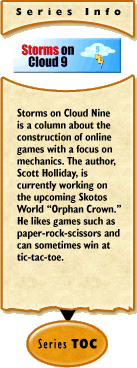
Simple Arithmeticby Scott Holliday
In fact, it's been said before, but perhaps the definition of RPG has taken on a second meaning. I know several players I've met thought that RPG stands for "roll playing game." Looking at the horde of computer games on the market that bill themselves as RPGs, it's hard to disagree. The one factor that seems to tie all of them together is the presentation of choices with mathematical consequences. Since computers don't use dice, RPG has come to mean calculation of odds, summation of numbers, use of powers and effects to achieve easily demonstrated advantage. Strangely, the real definition is often more fitting for games that don't even use it! In any case, if you say your game is an RPG, your players will want and expect mathematical challenges. You could be a purist, and ignore them, or you could cave in and try to please them. The purists in history (especially gaming) are generally squashed and forgotten. If you doubt my word, look at pro-wrestling or politics. On the other hand, without innovation, your game will be another meaningless clone. There are other choices. You can mix it up a little. But, where's the happy medium? Probably off somewhere staring at a crystal ball… not much help there. Regardless, you have likely decided that you like mathematical puzzles, so your players will too. I know that's my stance too, though I don't want to take it too far. So how do you make math more fun? Perhaps the next step is to figure out what makes a good set of choices. And… I'll save that topic for next time. |
